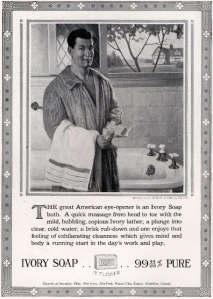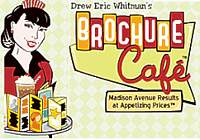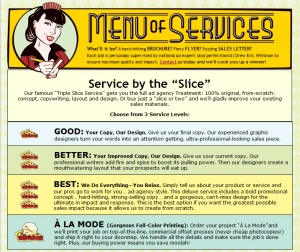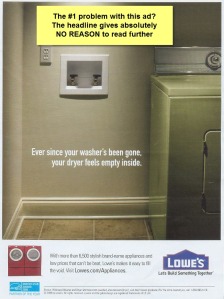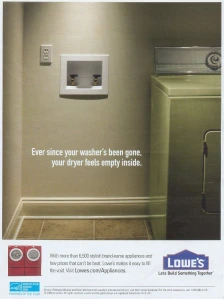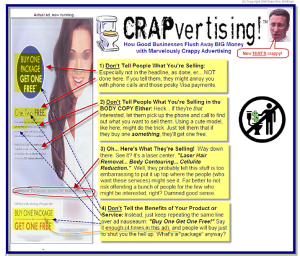 Dale King: Today, I’m interviewing author, direct response specialist and master copywriter Drew Eric Whitman. Hello Drew, how are you? EKUQHM22CGN4
Dale King: Today, I’m interviewing author, direct response specialist and master copywriter Drew Eric Whitman. Hello Drew, how are you? EKUQHM22CGN4
Drew Eric Whitman: Well, the sun is shining… I have my health… I live in a beautiful part of the U.S… and have the pleasure to be associated with YOU… what the heck could be better?
Dale: Drew, how did you get started marketing your services on the Internet?
Drew Eric Whitman: Not too long ago 99.9% of all my orders for books and audio programs would come via checks and money orders sent to my post box.
HA! I remember telling someone, “No one is ordering anything online now!” and few were. A trusted business advisor of mine asked me, “Why don’t you get a CompuServe account” My response was something like, “CompuWhat? HUH!? What do I need that for? What will I DO with it?”
Even so, as far as advertising consultants go, I probably was among the first online. I think this was in the late 80s. My first site was pretty basic… no bells or whistles. And that’s still most effective today. When you create a web site, your goal is not that people say, “Hey, what an awesome site!” Instead, you want them to say about the product you’re selling, “Hey… I want one of these!” It’s the same with your advertising. If you want to know if it’s a good ad, show it to your target market. If they remark how beautiful your photos are… how skilled your font selection… even how clever your headline, YOU’VE LOST. If they jam their hand into their pocket and rip out their wallet, YOU’VE WON.
Dale: Some Internet marketing experts advise newbies to steer clear of Internet marketing, because it’s too competitive. Do you agree with that assessment?
Drew Eric Whitman: No. Of course, when you jump online, you join the earth’s biggest marketplace. If you’re trying to sell a common product, of course the competition will be intense. But too intense to try? Nah. You always have to try. But try ONLY if you know what you’re doing. Or try by getting specialists to do for you what you can’t.
If you wanted to build a house, but you personally didn’t know which end of a hammer to hold, would you simply say, “Shoot! I want a house, but I don’t know how to use a hammer. Welp, I guess I should forget about this dream of building my own home.” Of course not. You’d find people who DO know how to hold hammers and let them assist you!
And what kind of newbie are we talking about here? An internet newbie? Business newbie? Copywriting newbie? Industry newbie? A so-called “newbie” might very well know more about how to construct a powerful-selling email than some of the old-timers who have been unsuccessfully sending one crummy email out after another for years.
Dale: How is Internet marketing different now, as opposed to when you first got started online?
Drew Eric Whitman: More competition as more people jumped on board. More merchant tools and technology. But still, most online marketers still don’t grasp that to be effective, web advertising must still follow the rules of effective OFFline advertising that go back over 100 years.
So, what you have is all the people who didn’t know how to create effective ads and who couldn’t afford the media cost to place them (in newspapers, magazines, radio or TV), with access to a virtually “free” medium on which to place ads that follow NONE of the rules of effective advertising.
In other words, before we couldn’t SEE these people’s advertising because they couldn’t afford the media costs to place the ads. But now, thanks to the internet, we see them all. Ugh. For those who know how to write ads, we’re not so much afraid of these people’s ads as we are the clutter that our prospects have to wade through to find ours!
Dale: How important has goal-setting been to your overall success?
Drew Eric Whitman: I’m very visual. I picture what I want and drive aggressively toward it. I’m not so much a “write-things-down-to-achieve” person. The images of what I want are so burned into my brain that they keep me going.
I think more than goals, however, is a love for what you’re doing because (and this is important) YOU DO IT BECAUSE YOU WANT TO DO IT. When I’m working on my own projects, especially, work is really more like “play” to me.
I’m very fortunate. Creating advertising has been a love of mine since I was 11 years old and I passed out one-page catalogs that I typed on my father’s old fabric-ribbon manual Royal typewriter. Then I cut pictures from my suppliers’ joke and gag catalogs and pasted them on my “camera-ready” sheet using a dark brown jar of rubber cement my dad had in his home office. The jar had a screw-off lid with a long metal-handled brush that I used to dip into the mighty-powerful-smelling rubber cement and spread the thick goo onto the paper. A few Xerox copies later, I was handing them out in class and collecting orders for things like whoopee cushions and phony chopped-off fingers. (They were fun in the lunchroom.)
That was my foray into direct selling, catalog marketing, and copywriting. So if you love what you do—really love it—that love will help drive you to achieve your goals. It’s the fuel. Of course, every good vehicle needs more than gas. It also needs a steering wheel and a course of direction. So you do need some clarity about WHERE you want to go, and for most people written goals would probably be helpful.
Dale: How important has reading been to your overall success?
Drew Eric Whitman: I have a degree in advertising and was fortunate to train under the great Walter Weir, whose name is mentioned in many of the classic books of advertising copywriting.
However, as a copywriter, I am self-taught. Remember, I started writing advertising when I was a child so by the time my college classmates graduated with their advertising degree, I had already been writing ads, brochures, and sales letters for about a decade. For some reason, advertising was always in my blood.
I studied the greats of advertising: Caples, Hopkins, Schwartz, Ogilvy and others. And most of all, I did it with a passion. Even today, a powerful sales letter is a thing of beauty to me. I know it sounds funny, but it’s this passion that has made me successful at what I do. And at the same time, I believe I have an innate ability to write well and a great sensitivity for words and language.
Dale: If you could recommend one book that all Internet marketers should read, what would it be?
Drew Eric Whitman: “Internet schminternet!” Here’s a book ALL businesspeople should read: “Making Ads Pay” by John Caples. Fascinating. But one book is not enough. So after you gobble that one up, read, “Tested Advertising Methods” also by Caples. Then grab, “Breakthrough Advertising” by Eugene Schwartz. And don’t miss, “My Life in Advertising /Scientific Advertising” by Claude Hopkins.
After reading these 4 books, you will know more about how to create powerfully effective advertising than 99% of your competitors. And that’s no advertising claim. It’s the damned truth. Ignore this tip at your own peril.
(Not 1-in-100 will do what I just suggested… to read those books. Most won’t read just one of those books. And this is exactly why most advertising on planet earth is ineffective trash.)
If you want a fascinating crash course in advertising psychology and learn the little-known tricks that ad agencies use to persuade people, then I suggest my own book, “CA$HVERTISING“.
Dale: In your opinion, what technology has changed Internet marketing the most over the last 5 years?
Drew Eric Whitman: Probably pay-per-click advertising, only because it gets people to your site. But to me, the focus on technology is the wrong focus. Spend your time focusing on how to write effective ads. The technology is the technology. It’s there to use if you want to. But if your ads stink, all the tech in the world means nothing. All you’ll do is spend money to get people to your cool, high-tech (but crappy) site. And in a few seconds after you bore them to death, they’ll be off to someone else’s possibly low-tech (but well written, strong-selling) site, perhaps to spend money with THEM instead of you.
“Huh? How did that happen? I have a cool Flash splash page… awesome music… cool moving type… and amazing mouse-over effects. Sure, I never studied how to write ads, but look at how cool my site is! People will buy because they see how technically sophisticated I am.” (Can you spell, “Out of business?”)
Dale: What new technology do you see changing Internet marketing over the next 5 years?
Drew Eric Whitman: Re-read my answer to the previous question.
Dale: If you could give my readers one piece of advice, what would it be?
Drew Eric Whitman: Without question, the single most important thing I could possibly advise any businessperson—in any industry—to do, is to read the books I’ve recommended above. To MAKE A STUDY OF ADVERTISING. Learn what works… don’t simply “do stuff and see what happens.” That’s what most businesspeople do, you know.
They say, “Hey, I have a product and I want to sell it. And because of this, I will do this thing called advertising. The way you do it is you write some stuff about the thing you want to sell… and then lots of people throw money at you!”
Yeah, right. Sounds great, but how effective would you be as a surgeon if your attitude was, “I want to be a surgeon. Surgeons take a sharp knife called a scalpel and they cut things. My friend Steve has heart problems. Tomorrow, after lunch perhaps, I will go to Steve’s house with my scalpel and begin cutting.”
Ridiculous, right? Why? Because this idiot doesn’t know the first thing about surgery. Sure, he can cut. Any monkey with a scalpel can cut. In fact, both could equally as effectively cut off their own heads. And sure you CAN advertise. Anyone who can place an ad and pay for it CAN advertise. But how EFFECTIVE will your surgery be if you don’t know WHERE to cut… HOW to cut… WHEN to cut. How many sales will you make if you don’t know WHAT to say… HOW to SAY it… and WHEN to say it?
Results? Your patient dies… your ads bomb. The missing element? EDUCATION. You need to learn HOW… FIRST!
To get them started, I invite readers of this interview to subscribe to this blog by clicking the “EMAIL SUBSCRIPTION” or RSS feed buttons at the top-right of this page.
Dale: Thank you very much Drew. I appreciate you taking the time to do this interview.
Drew Eric Whitman: The pleasure was mine, Dale. <HANDSHAKE>
EKUQHM22CGN4
 “What the #$&^@?!”
“What the #$&^@?!”



